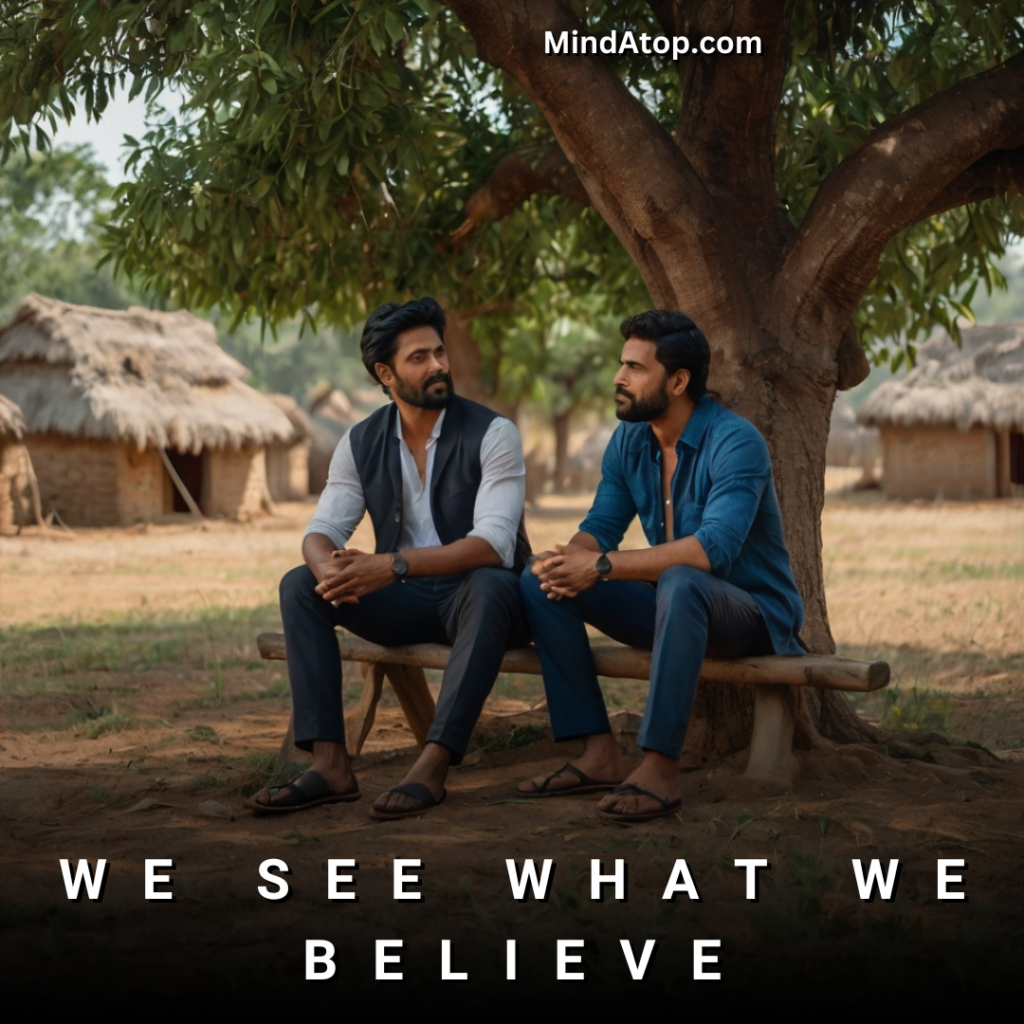We See What We Believe
A heartwarming story of two men that proves we see what we believe through the eyes of our own perspective
In a small village, there lived two neighbours, Ramesh and Shyam. Their homes stood next to each other, and both men were known for their hard work and honesty. But there was something that always sparked disagreement between them—an old mango tree that stood right in the middle of their shared backyard. The tree was a reminder that We See What We Believe: for some, it could be a blessing, and for others, a burden.
The tree had been there for as long as they could remember, and it was a blessing to many in the village. It bore delicious mangoes every summer, and its wide, leafy branches provided shade during the hottest days. But there was one issue: some mangoes from the tree always fell into Shyam’s yard, while others landed in Ramesh’s.
One hot afternoon, both men were sitting under the tree, enjoying its cool shade, when Shyam suddenly stood up, looking annoyed. “Ramesh, look at this! Every year, I have to pick up the fallen mangoes from my yard. Why can’t we trim the tree so that the mangoes don’t fall into my space? It’s such a mess!”
Ramesh looked at the tree calmly. “Shyam, the tree has been here long before we moved in. It’s been giving us fruit and shade. A few mangoes falling into your yard are nothing. We’re lucky to have it.”
Shyam frowned. “Lucky? I have to clean up all the fallen mangoes, and they’re all over my yard. It’s inconvenient. I can’t enjoy my space properly. This tree is causing me trouble. It feels unfair!”
Ramesh leaned back against the tree, smiling softly. “Shyam, the tree is neutral. It’s not good or bad on its own. Mangoes fall in both our yards, but how we see the situation is what matters. We See What We Believe. To me, the tree is a blessing—it provides us with fruits and shade. But to you, it’s a burden, because of how you’ve been conditioned to see things.”
Shyam was silent for a moment. He had always found life to be a series of struggles. Growing up, his father had been strict, constantly pointing out what was wrong with everything, never giving him space to appreciate the good. He had grown accustomed to seeing the negative side of things, where every small inconvenience felt like a huge problem.
Ramesh, on the other hand, had grown up in a different environment. His father was calm and positive, teaching him to look for the good in every situation. He learned to appreciate life’s small blessings, even if they didn’t seem perfect. To Ramesh, the fallen mangoes were simply a part of life—a gift from the tree, to be shared between neighbours.
Shyam, after hearing Ramesh’s perspective, began to reflect on his own beliefs. He realized that the situation hadn’t changed—the same mangoes were still falling. But it was how he saw them that made all the difference. His negative outlook had clouded his ability to see the tree for what it really was—a source of bounty, not a problem.
With a deep breath, Shyam turned to Ramesh. “I see it now. The tree is not the problem. It’s how I’ve been viewing it all along. Perhaps I need to change the way I look at things.”
From that day, Shyam tried to see the tree differently. He didn’t view the mangoes as a mess anymore. Instead, he saw them as a reminder of the abundance life offered. The tree remained neutral, but how the two neighbours saw it depended entirely on the beliefs and experiences that shaped them—proving once again that We See What We Believe.
Must Read Stories:
Raise Your Beliefs! – “If you shift what you believe, you’ll shift what you see.”
Craft a Miracle! – “What if belief is the real ingredient of magic?”
Present is where the Past ends – “Let’s return to where you stopped dragging yesterday forward.”

